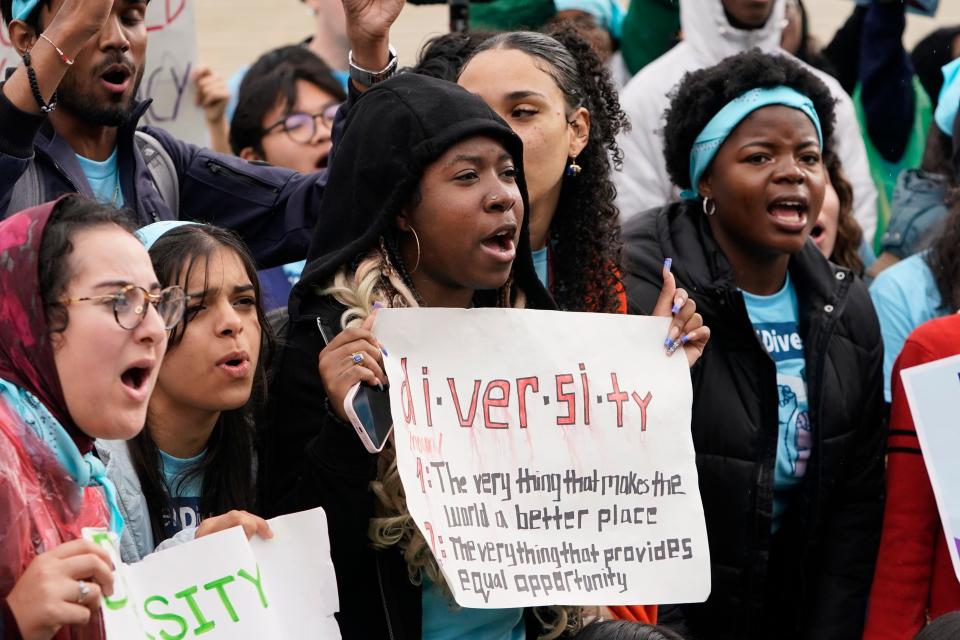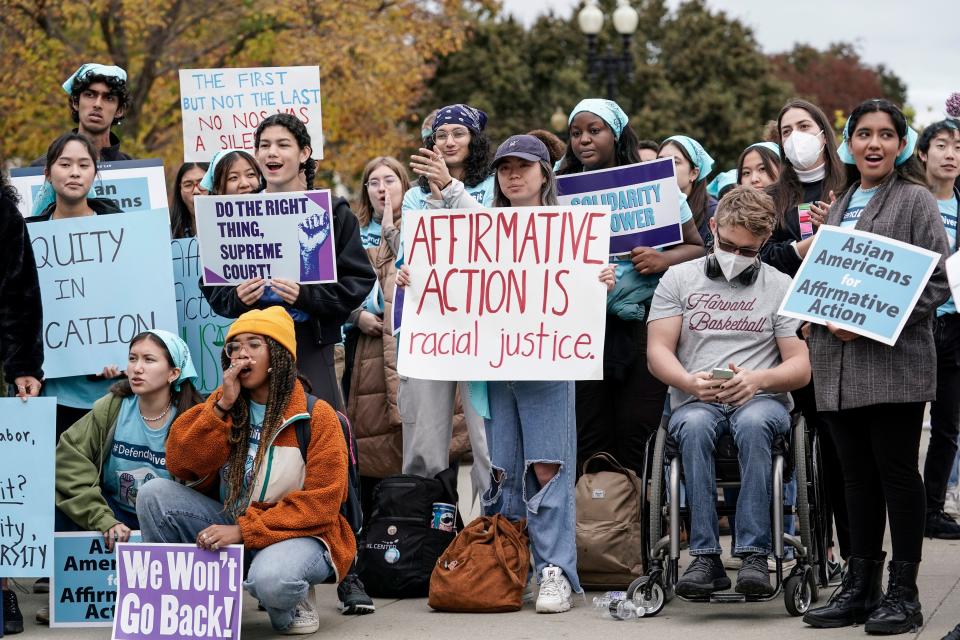How will the US Supreme Court decision to end affirmative action affect Arizona?
The U.S. Supreme Court on Thursday issued an opinion gutting affirmative action policies, a decision that overturns decades-old precedent that benefited Black, Latino, Native American and other students from underrepresented groups seeking higher education opportunities.
Some admissions experts and advocacy groups fear the ruling will hinder efforts to diversify the nation's elite colleges.
But in Arizona, universities and civil rights experts say little is expected to change. The state is one of eight that already bans consideration of race, ethnicity or gender in admissions decisions at state institutions, including Arizona's three public universities.
Arizona also doesn't have a track record of "selective admissions" in higher education, according to Nolan Cabrera, a University of Arizona professor who studies racial dynamics on college campuses. He said that may help minimize the effects of the ruling in Arizona.
Still, he said he is concerned about the message the ruling could send in a state that has struggled with higher education attainment, particularly among people of color and low-income people.
"The Supreme Court today is essentially making the argument that race doesn't matter, that racism is not a systemic reality," Cabrera said. "Let's not get it twisted, it has nothing to do with fairness or merit."

While the number of students of color pursuing degrees at Arizona's public universities has grown in recent years, Black, Latino, Asian and Native American students still see lower rates of college attainment than white students, according to research from Helios Education Foundation, an Arizona-focused nonprofit that works to increase educational opportunities.
Latino students, in particular, are significantly underrepresented on college campuses compared with white students.
"Now more than ever, colleges and universities must come to better understand and implement more inclusive strategies within the confines of these bans to yield diverse college student enrollment and completion," said Marla Franco, vice president of Hispanic-Serving Institution Initiatives at the University of Arizona and co-founder of the Arizona Hispanic-Serving Institutions Consortium.
“The exchange of best practices, coupled with continued advocacy and heightened strategy will be essential," Franco said in a statement.
What is affirmative action?
In the context of higher education, affirmative action refers to admissions policies aimed at increasing the number of students from underrepresented groups on university and college campuses.
The Supreme Court first laid the groundwork for modern affirmative action policies in a 1978 ruling in the case Regents of the University of California v. Bakke, in which a white man in his 30s sued the medical school at the University of California, Davis, for setting aside a certain number of spots in each incoming class for students from underrepresented groups.
In that case, the Supreme Court determined that specific racial quotas are unconstitutional in college admissions. But it also affirmed the legality of considering race as one of many factors in admissions decisions.
Since then, some U.S. colleges and universities have opted to take race into consideration alongside other factors like grades, test scores and extracurricular activities. There have been other court challenges to affirmative action since 1978, but the fundamental idea that race can be considered in college admissions has held up.
Arizona's affirmative action ban

In 2010, Arizona voters approved Proposition 107 to ban the consideration of race, ethnicity or gender by units of state government, including public universities, with about 60% support.
In other states that have banned affirmative action, including California, Michigan and Texas, schools quickly saw big drops in the number of Black, Latino and Native American students admitted to campus.
But in Arizona, that didn't happen. Instead, racial breakdowns of public universities' student bodies remained mostly consistent. Cabrera said that's because Arizona's public universities and colleges were already accepting a wide swath of their applicant pool.
"In the state of Arizona, we tend to admit anywhere between 60 to 80 percent of all applicants, so there's sort of a bare minimum of qualifications that students need to possess in order to get in," he said. "There's this mistaken idea that if you reject more students, that you're a better quality institution, and that's usually where you'll see the biggest declines in racial and ethnic representation."
Will affirmative action decision impact private colleges?

Many of Arizona's private colleges don't currently have affirmative action policies in place. That includes Grand Canyon University, one of the largest in the Phoenix metro area.
"Most universities don't use affirmative action," said Michael Selmi, a professor at ASU's Sandra Day O'Connor College of Law who specializes in employment law, discrimination and civil rights. "It's really much more limited in scope than I think most people think."
GCU officials said that they have instead focused on keeping tuition and housing costs low. Currently, tuition costs $16,500 each year, but all admissible students are offered academic scholarships, said GCU spokesperson Bob Romantic. After applying GCU's academic scholarships, which are GPA-based, students paid $9,200 on average in tuition last year.
The university also offers geography-based scholarships to students living in the immediate area around the school's west Phoenix campus. Those scholarships cover the full cost of tuition for four years, Romantic said, and since 2015, GCU has awarded over 700 of them.
Race and ethnicity aren't considered for that geographic scholarship, he said. But since the neighborhood around GCU's campus is predominantly Hispanic, he said nearly all of the scholarship recipients have been students of color.
"Diversity on a college campus can be created through a system of meritocracy without affirmative action if tuition, room and board are affordable," Romantic said.
The new Supreme Court ruling sets a standard of treating private and public universities the same when it comes to affirmative action, Selmi said.
"There was some question before this case as to whether there was a difference between the private and public," he said. "Generally it was that the private schools had more leeway than public schools under the Constitution, but they have eliminated that distinction."
That means private universities and colleges will no longer be able to use or implement affirmative action policies. But it also doesn't preclude GCU from continuing its same approach to increase diversity. Selmi said some income- and geography-based approaches to admissions, scholarships and recruitment efforts would still be permissible.
The Supreme Court in Thursday's ruling is "trying to keep the opinion consistent with past precedent, and past precedent has allowed some use of race," he said. "It really depends on how it's justified. And I think that's still true."
For public universities, diversity without affirmative action
The standards for admission to Arizona's public universities are based "solely on academic performance," said Lyndel Manson, chair of the Arizona Board of Regents, which oversees the state university system.
"We are reviewing the decision ... but do not anticipate any impact at our universities," she said in a statement.
Arizona State University said in a statement that Thursday's high court ruling will have "no impact" on the diversity of its student body.
"Because ASU admits all Arizona students who meet the university’s admission requirements and does not artificially cap enrollment for students from Arizona, ASU will continue to have one of the most diverse student bodies in the country," the statement said.
The University of Arizona has bolstered diversity in its student body without race-conscious admissions efforts since the Proposition 107 decision, said spokesperson Nick Prevenas.
"As the state's land grant university and a Hispanic Serving Institution, we are proud to have seen significant growth in diversity of our student body over the last decade," he said.
Northern Arizona University remains committed to equitable access to higher education, said spokesperson Kimberly Ott.
"While NAU’s admissions process is not race-conscious and thus not affected by today’s decision, we have continued to advance efforts ... ensuring that all Arizonans are both well represented and well served by our university through inclusive outreach efforts, clear admissions requirements, equitable financial aid policies, and effective support services," Ott said.
Advocates for higher education attainment react
Advocates for improving access to higher education among underrepresented groups criticized the Supreme Court's ruling.
The decision to remove race as a potential factor in college admissions "could undo decades of progress that our Hispanic, African American, and Native American students have made in accessing postsecondary education," said Teresa Leyba Ruiz, former president of Glendale Community College and a senior leader with Education Forward Arizona, which advocates for ways to improve education attainment.
Education leaders have worked for years to increase the percentage of Arizona's adults with a post-secondary degree or credential. Eliminating affirmative action, she said, could hinder reaching that goal.
Thomas Saenz, president and general counsel of the Mexican American Legal Defense and Educational Fund, said the Supreme Court majority was "backwards-thinking."
"Today's decision demands a renewed and invigorated commitment by all education policymakers to greater equity in admissions," he wrote in a statement. "This means concentrated efforts to root out systemic and ongoing inequities in the K-12 pipeline" as well as identifying and eliminating admissions criteria that have a discriminatory effect on students of color.
Arturo Vargas, chief executive officer of the National Association of Latino Elected and Appointed OfficialsEducational Fund, said he "vehemently disagrees" with the Court’s ruling. It will exacerbate workforce shortages and worsen the impact of academic challenges faced by Black and Latino students during the COVID-19 pandemic, he said.
Arizona Republic reporter Daniel Gonzalez contributed reporting to this article.
Sasha Hupka covers higher education for The Arizona Republic. Do you have a tip on Arizona's universities, community colleges or trade schools? Reach her at sasha.hupka@arizonarepublic.com. Follow her on Twitter: @SashaHupka.
OFFER FOR NEW SUBSCRIBERS: $1 per month for 12 months of access to azcentral.com. Subscribe at azcentral.com/NewsSale.
This article originally appeared on Arizona Republic: How will ruling ending affirmative action affect Arizona?

